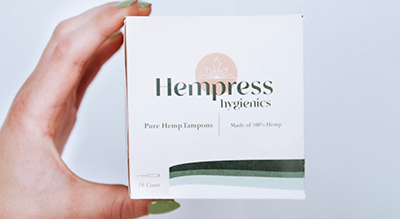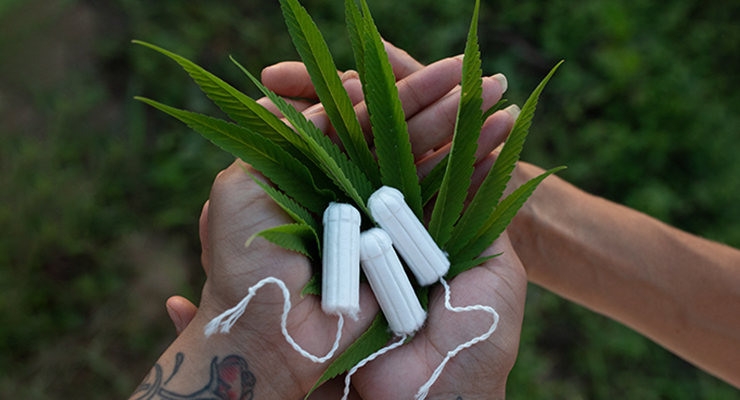This past month, British environmental activist Ella Daish, founder of the #EndPeriodPlastic campaign, traveled across Europe to the Procter and Gamble (P&G) headquarters in Geneva, Switzerland – a global leader in feminine hygiene products – from her native London to leave a life-sized tampon applicator that she made out of 1,200 discarded Tampax plastic applicators on their doorstep. The piece of protest art was made from the applicators that were picked up along U.K. beaches and waterways by herself and social media followers who she had asked to send them to her for the project. Her goal was to return the discarded plastics that are polluting the environment, which take hundreds of years to decompose, to the company that she says has been “least responsive” to her push to eliminate such plastics from their products.
“The time for change is now,” she said in a YouTube video. “We know that collective action is needed to bring about change for the environment. And that includes industry. That includes Procter and Gamble. They constantly put the ownership of this problem onto the individual, but that’s not right. They have got the money and the power to affect change, and that’s exactly where it needs to happen. We need to bring out change at source so that we can stop the negative environmental impacts downstream.”
A P&G spokesperson told The Guardian that they are in agreement with Daish that plastics don’t belong on beaches and are working to address the problem with European waste infrastructure to encourage proper disposal to reduce pollution. Daish, however, calls these period plastics an “unnecessary use of single-use plastic,” and she’s calling upon her fellow menstruating women to join her in the movement to have P&G remove plastic tampon applicators from all products, reduce the amount of plastic from tampons and pads in their Tampax and Always products and demand reusable alternatives.
While Daish works to target P&G, two budding entrepreneurs in the feminine hygiene market are getting ready to launch startups selling tampons, pads and pantyliners made using hemp fiber with zero plastic in 2022. Industrial hemp is a botanical class of cannabis sativa. Among the quickest-growing plants, hemp – one of the first plants to be spun into usable fiber – can be used in a variety of products including rope and biodegradable plastics.
One is Tennessee-based Trace Femcare, Inc. and the other is Hempress out of Texas. According to Trace Femcare founder Claire Crunk, 500 million pounds of crude oil plastics from disposable menstrual products are found in landfills in the U.S. annually, along with cottons rich in pesticide and fertilizers and tree-based pulp. Crunk, a former nurse practitioner with the Middle Tennessee Women’s Health Group who saw patients who experienced vaginal issues such as irritation from their feminine hygiene products, says menstruating women are seeking alternatives such as absorbent underwear, menstrual cups and washable pads. However, these products, she says, use earth-harming synthetic materials. Seeing a need in the market for environmentally-friendly menstrual products, Crunk founded Trace Femcare to make tampons and applicators made from regeneratively-grown hemp fiber and organic cotton .
“There are 500,000 pounds of menstrual product waste in the U.S. landfills per year,” says Crunk. “It’s time for menstruators to heal the earth in the vein of talking about the volume of period trash.”
Bleeding Edge
A bout of burnout from her job as nurse in 2018, she learned about hemp fiber during a chance encounter with a fellow concert-goer at the Pilgrimage Music and Cultural Festival in Tennessee two years later. The event was sponsored by the Tennessee Hemp Industry Association. After the show, Crunk did her homework and reached out to a corporate farmer and another friend in the textile industry and attended her first hygienics conference in Orlando, FL.

Megan Galaske and Claire Crunk of Trace Femcare
With Trace Femcare, the up-and-coming brand founded last August is taking a carbon-negative approach to power regenerative agricultural practices that reverse climate change before it’s too late. The new brand will create its products using regenerative cotton, which is grown using a variety of cultivation methods that sequester carbon from the environment.
Earlier this year in the U.S., the Biden administration announced its climate change strategy to adapt regenerative practices that reward farmers for mitigating their carbon footprint by adapting regenerative practices that would sequester carbon emissions. These include rotational cattle grazing systems that allow soil and grass to recover and applying compost in lieu of chemical fertilizers to pastures to avert tilling.
For Crunk, her budding business is what she calls a “climate-saving” superpower if menstruating women would join the bandwagon against period plastic pollution.
Trace Femcare’s menstrual products, which include panty liners, pads and tampons, are being made in Europe with a blend of hemp grown in North Carolina and organic cotton grown in California. The tampons function the same as the ones on the market, except, in lieu of a plastic applicator, women would use their fingers to ensure proper insertion, though the brand is still looking into other alternatives like a cardboard applicator; the menstrual products won’t be packaged in a plastic overwrap either.
Crunk says her products are slated to be on the market in fall 2022.
Meanwhile, hemp-based panty liners, tampons and pads that are made of antimicrobial fibers free of toxins, plastics, hormone disrupters and fragrances from startup Hempress are slated for market release early next year. The name “Hempress” – operated by Marilyn Austin and McKenna Avery, recent graduates of Oregon State University and the University of San Diego – is a convergence of hemp and empress as in its tagline “all hail the female.” More than just a feminine hygiene brand caring for the environment, the startup also seeks to empower women and champion their livelihoods as much as their health by making these products available globally via partnerships with nonprofits such as Period.org, as well as providing education, advancing career opportunities and investing in women’s health care.

Hempress Pure Hemp Tampons
“We’re focused on female empowerment and embracing your womanhood,” says Austin.
Her nonprofit was borne out of a hemp innovation lab in which Austin attended while at Oregon State University in 2019. The Netflix documentary Period. End Of Sentence. also inspired Austin. The documentary chronicles the lives of women living in a rural village outside Delhi, India, when they learn to manufacture sanitary pads to challenge the stigma around menstruation.
While learning about the benefits of hemp fiber, her interest in sustainability piqued in 2018 when then-President Donald Trump signed the Farm Bill. The legislation provides support, certainty, and stability to the country’s farmers, ranchers, and forest managers by enhancing farm support programs, improving crop insurance, and supporting voluntary conservation, among other provisions.
“Menstrual products was a good place to start,” says Austin. “The traditional menstrual care industry is not sustainable mostly because of the synthetic fibers and plastics.”
Hempress’ pads and tampons, made with hemp, are free of toxins, plastics, hormone disrupters and fragrances. One acre of cotton, she says, emits 300 pounds of carbon

Marilyn Austin and McKenna Avery of Hempress
Hempress menstrual products are Oeko-Tex class one certified and are slated for a February or March release in 2022 on the Hempress website.


